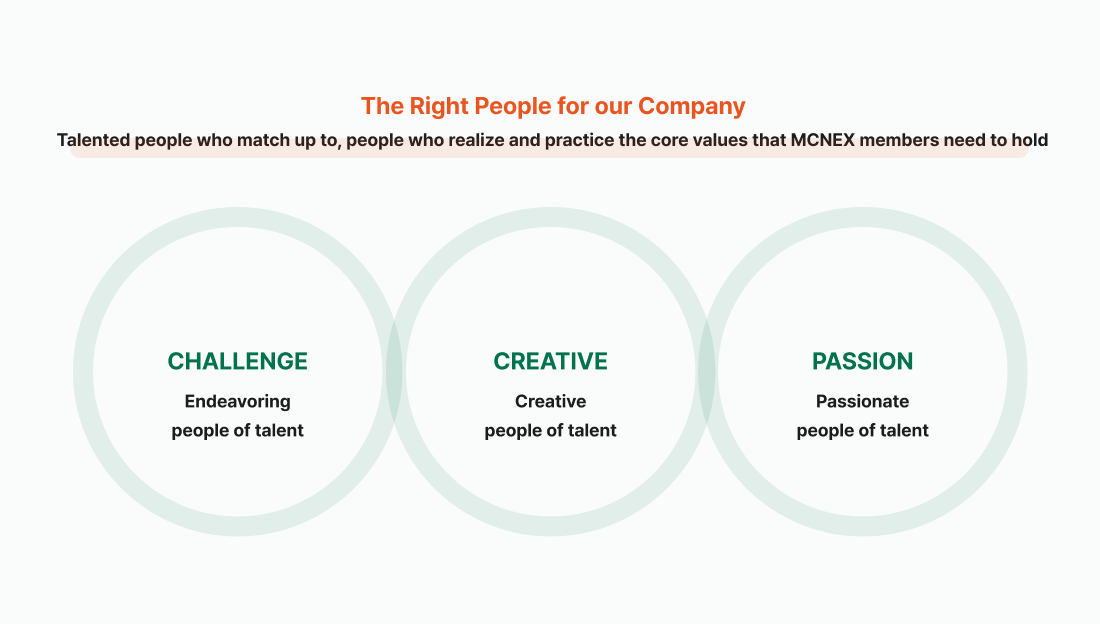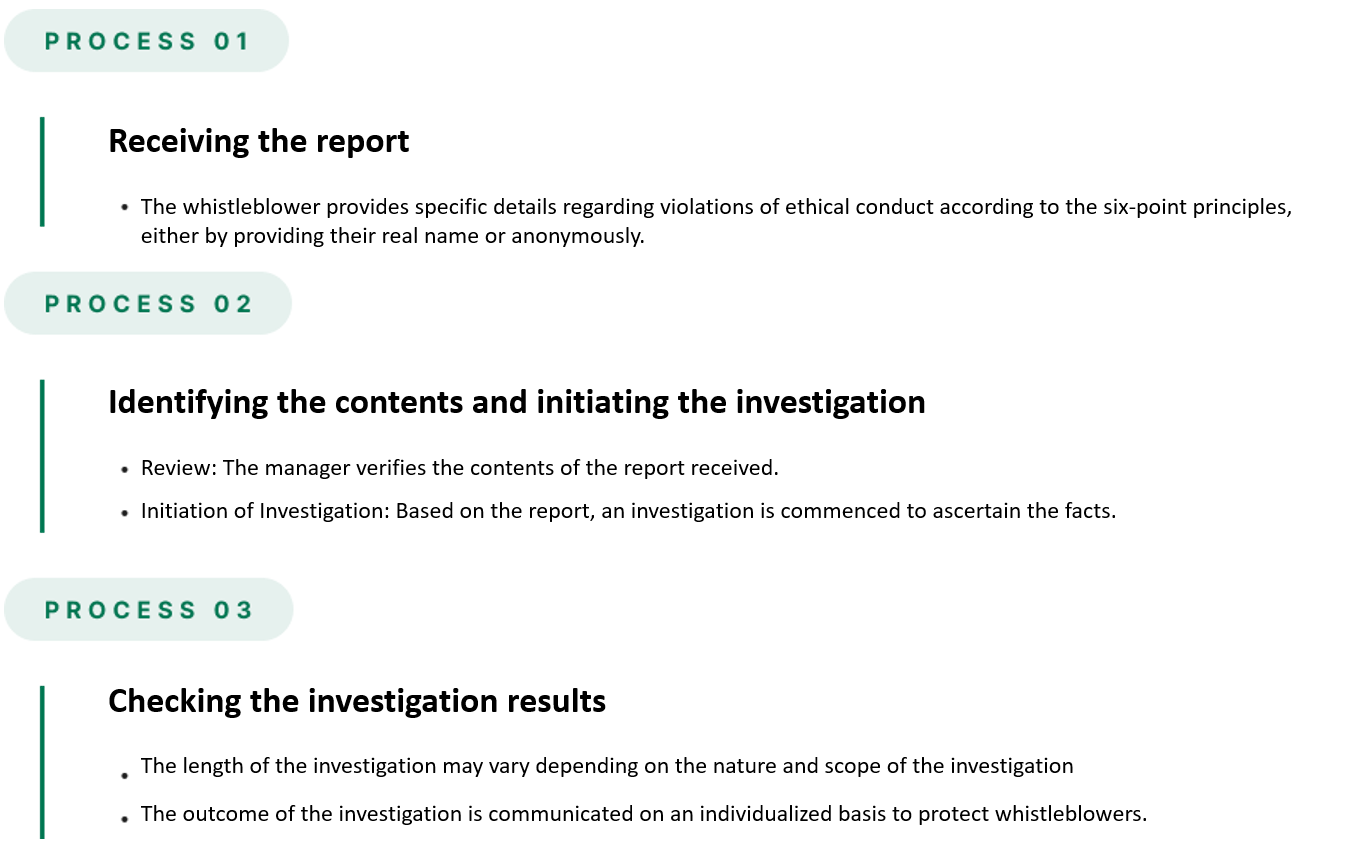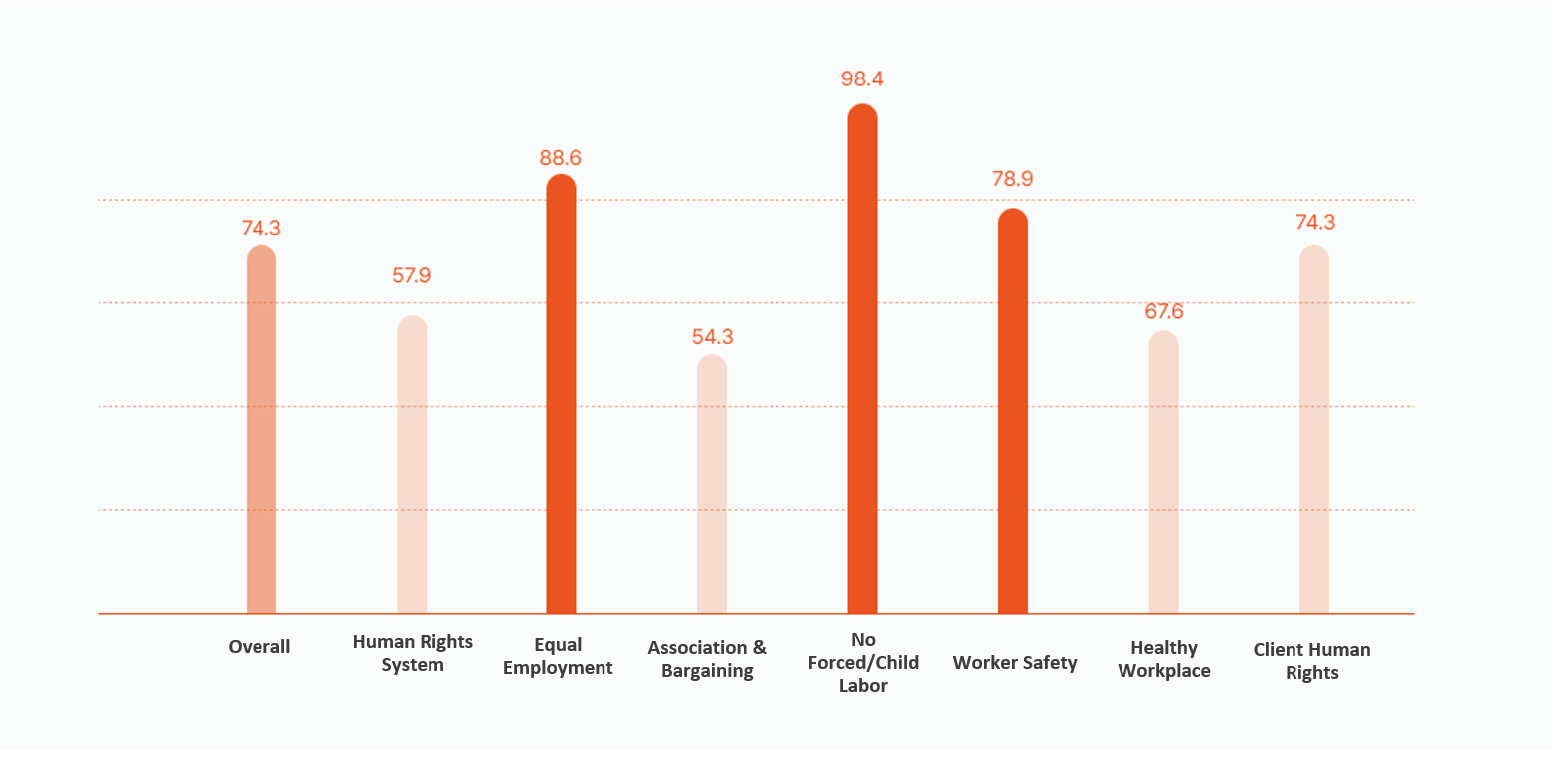
Talent Management
Talent Recruitment

Based on its desired talent attributes of "Challenge, Creative, and Passion," MCNEX conducts fair and competency-based recruitment, irrespective of gender, age, or race. Additionally, when new positions (T/O) or vacancies arise at its business sites, MCNEX operates an efficient recruitment process by utilizing an internal employee referral program.
Talent Development
MCNEX provides training to all employees to help them acquire job-related knowledge and skills, and offers ample educational opportunities along with a suitable work environment to support their competency development and improve their quality of life. The company enhances employees' job expertise (including skills, knowledge, and experience) by actively promoting internal and external training programs and seminar attendance, utilizing methods such as online education, in-house group training, and internal instructors. Furthermore, for the successful onboarding of new employees, MCNEX operates a mentoring program that includes financial support for mentoring activities. Outstanding mentors and mentees are selected and awarded annually.
Training Programs

Evaluation and Compensation
Performance Evaluation
MCNEX, which pursues flexible talent management enabling both individuals and the organization to grow together, conducts personnel evaluations that consider employees' career experience and work performance, irrespective of gender. This personnel evaluation comprises a performance evaluation, which assesses the degree of achievement and actual results against departmental and individual goals, and a competency assessment, which evaluates individual competency levels.
Personnel Evaluation Process

Compensation System
MCNEX provides the same corporate welfare benefits system to all its regular, temporary, and contract employees without discrimination. Going forward, MCNEX will continue to foster a healthy and vibrant organizational culture that enhances employees' quality of life and promotes work-life balance through various welfare benefit programs.
Additionally, MCNEX regularly monitors through its company-wide HR system to ensure no wage gap occurs between male and female employees at the same job level. As of the end of 2024, there have been no cases of wage discrimination between male and female employees of the same rank.
Corporate Culture
Work-Life Balance
Work-life balance (WLB) is an important factor in a company's sustainability management. MCNEX is responding to the changing mindset of employees who value WLB and promotes policies such as childcare leave and reduced working hours for pregnant employees to encourage the economic participation of female talent in an era of low birth rates and an aging population. MCNEX encourages both female and male employees to take childcare leave; in 2024, out of 7 employees who took childcare leave, 6 were male employees.
Additionally, MCNEX has introduced and operates a flexible working hours system (flextime system) where employees can autonomously choose their work start and end times. This system allows employees to work additional hours during peak periods and leave earlier during less busy times, leading to improved work efficiency. The company actively encourages the utilization of this system, enabling schedule adjustments that reflect individual needs such as increased leisure time and self-development, which in turn has enhanced employee satisfaction.
Work-Life Balance Systems
Flexible Working Hours System | A system allowing employees to autonomously choose their work start and end times within standard working hours. |
Overtime Monitoring System | A monitoring system that automatically records employee work start and end times and tracks working hours in real-time. |
Promotion of Leave Utilization | · Provision of summer leave |
Other | · Data-driven HR management |
Welfare Benefits
MCNEX implements various welfare benefit programs, striving to create an environment where employees can focus on their work. Starting with employee health initiatives like medical check-ups and smoking cessation funds, and extending to housing support, the provision of rest areas, long-term service awards, mentoring, as well as cultural activities including in-house clubs and workshops, MCNEX promotes the improvement of employees' quality of life and work-life balance.
Welfare Benefits

Employee Satisfaction Surveys
MCNEX conducts employee satisfaction surveys to understand the level of its corporate culture and, based on the results, strives to create a company where everyone wants to work. The satisfaction survey consists of three main areas—‘Employee Well-being,’ ‘Sustainable Community,’ and ‘Organizational Culture’—along with 12 detailed sub-items. The survey results are also managed from a business sustainability perspective.
MCNEX VINA also conducts annual employee surveys to prevent potential human rights and labor risks, and strives to improve the working environment by reflecting employee feedback. In the satisfaction survey conducted in 2024, 3,862 out of 4,130 employees participated, achieving an average score of 72.3 points.
Employee Satisfaction Survey Results – Headquarters

ESG Hotline System
MCNEX has established an ESG Hotline System, an integrated channel for reporting ESG issues, to enable internal and external stakeholders to express their opinions more conveniently and effectively. Through the ESG Hotline System, all stakeholders can anonymously report on all aspects of sustainability management, such as environment, labor and human rights, safety and health, and ethical management. The identity of the reporter and the content of the report are treated confidentially, and MCNEX thoroughly protects reporters from any disadvantages or discrimination by the company for making a report, statement, or submitting materials.
As a result of these proactive ESG management practices and efforts to build trust with stakeholders, zero issues were reported through the ESG Hotline System in 2024. Going forward, MCNEX will continue to strengthen communication with all stakeholders through transparent and sustainable management activities, and will realize social value as a responsible corporate citizen.
Taget | Type |
Corruption and abuse against Supplier | Unfair bribery (including monetary gifts), acceptance of favors, provision of privileges, coercion to disclose trade secrets, unfair directives, human rights violations, etc. |
Human rights violations | Discrimination, workplace harassment, labor conditions, humanitarian treatment, forced labor, and child labor, etc. |
Corruption / Irregularities | Acceptance of money / hospitality, personal requests, equity investment, unfair instructions, verbal/physical abuse, etc. |
Improvement of product and service quality | Issues related to inconvenience or necessary improvements when using the company's products and services. |
Damage to social value | Non-compliance issues related to environment, health & safety, social vulnerability, customer information, etc. |
Hotline Procedures

Labor-Management Relations
MCNEX's Incheon headquarters holds regular Labor-Management Council meetings quarterly to foster sound labor-management relations, convening additional meetings as needed. The Labor-Management Council operates with three representatives appointed by management and three elected by employees, respectively. Through these council meetings, various topics are discussed, including productivity improvement, employee grievance handling, safety and health, enhancements to the working environment, employee health promotion, and improvements to HR and labor management systems. As a non-unionized workplace, MCNEX promotes labor-management cooperation, enhanced employee welfare, management of employee association funds, and an improved work environment through open communication via the council and direct dialogue between employees and management.
MCNEX VINA guarantees freedom of association and the right to organize. As of December 2024, 3,763 of its employees were members of and active in the labor union. The labor union holds regular meetings annually to discuss key agenda items aimed at protecting employees' rights and interests, such as improving working conditions and enhancing employee welfare.
Human Rights Management
Human Rights Policy
MCNEX complies with international human rights and labor standards and guidelines, such as the Universal Declaration of Human Rights (UDHR), the UN Guiding Principles on Business and Human Rights (UNGPs), core conventions of the International Labor Organization (ILO), and the OECD Due Diligence Guidance for Responsible Business Conduct. To actively implement its human rights management and mitigate related risks, MCNEX has established a Human Rights Charter.
Furthermore, provisions concerning child labor and forced labor are specified in Article 6 of the Human Rights Charter, titled "Prohibition of Forced Labor and Child Labor." We verify the age of applicants before hiring, and as of 2024, there have been no cases of hiring workers under the age of 18 or any incidents of forced labor. Nevertheless, if any underage workers employed illegally are identified, support and remediation measures are implemented. For such underage workers, MCNEX conducts health check-ups and, if necessary, takes appropriate mandatory actions. It also provides support for the completion of their compulsory education and supports the child's income until they are legally eligible for employment. Moreover, in cases where underage workers are legally employed (but still require protection due to age), MCNEX, instead of resorting to dismissal or fines, transfers them to suitable training positions and restricts their working hours and types of work as appropriate.

Human Rights Risk Assessment
Human Rights Due Diligence
MCNEX's domestic headquarters conducted Human Rights Due Diligence, incorporating key human rights issues such as the establishment of a human rights management system and non-discrimination in employment, as recommended by the National Human Rights Commission of Korea. The Human Rights Due Diligence, conducted in July 2024, was an online survey where a total of 92 employees, including female workers (identified as a group vulnerable to human rights impacts), participated for one week. The due diligence process included questions about stakeholders vulnerable to human rights risks. It confirmed that female workers, persons with disabilities, and young workers are vulnerable to human rights impacts, in that order of vulnerability.
Following the recommendations of the RBA (Responsible Business Alliance), a global initiative, MCNEX VINA conducted a human rights due diligence survey. This survey covered 38 items on labor policies and business ethics, 4 items on stakeholder human rights, 6 items concerning religious practices, and 3 items on personal information.
Assessment Overview
Classification | Details |
Assessment | Regular assessment (conducted annually) |
Target | Conducted for employees of the domestic headquarters and Vietnam subsidiary |
Assessment Items | Human rights management system, Non-discrimination in employment, Guarantee of freedom of association and collective bargaining, Prohibition of forced labor and child labor, Ensuring worker safety, Healthy working environment, Protection of human rights concerning client companies, etc. |
Method | · Online self-assessment conducted using a 5-point scale checklist |
Potentially Vulnerable Groups | · Female workers, persons with disabilities, young workers, foreign workers, sexual minorities, etc |
Assessment Results & Mitigation Measures
The Human Rights Due Diligence results confirmed positive responses in areas such as the prohibition of forced labor and child labor, non-discrimination in employment, and ensuring worker safety. Regarding areas identified for improvement, such as the internalization of its Human Rights Policy and workplace reporting channels, MCNEX revised the Human Rights Policy and established the ESG Hotline System, communicating these developments to all employees.

Key Human Rights Management Activities
Employee Human Rights Education
MCNEX provides all employees with legally mandated training, including sexual harassment prevention training, disability awareness training, and workplace harassment prevention training. In addition to this mandatory training, MCNEX conducts further human rights education in its effort to prevent human rights violations.
Since 2021, MCNEX VINA has been providing its employees with training regarding human rights policies, and it also conducts additional annual human rights training specifically for its security personnel. This human rights education encompasses all core elements of human and labor rights as defined by the ILO, including the prohibition of child and forced labor, non-discrimination, the guarantee of freedom of association, and the recognition of the rights to collective action and negotiation.
Diversity and Inclusion
MCNEX stipulates in Article 1 of its Human Rights Charter, "Non-Discrimination," that discrimination is prohibited in all personnel matters—including recruitment, promotion, wages, and welfare benefits—on grounds such as gender, race, nationality, religion, disability, age, family status, pregnancy and childbirth, social status, or political views. Furthermore, MCNEX strives to prevent discrimination by focusing on employee education.
At its domestic headquarters, MCNEX provides training to all employees on preventing sexual harassment and workplace bullying. MCNEX VINA also conducts quarterly training for all its employees annually, covering topics such as recruitment, training, evaluation, wages, human rights, prevention of harassment and abuse, and non-discrimination policies.
Through these efforts, there have been zero cases of discrimination in the last three years. Should any case of discrimination occur, MCNEX will respond by strictly applying its zero-tolerance policy. Going forward, to help female talent adapt well to the company and perform key roles, MCNEX will continue to strengthen practical support measures, such as its mentoring program pairing female employees and the operation of a lounge for female employees.
